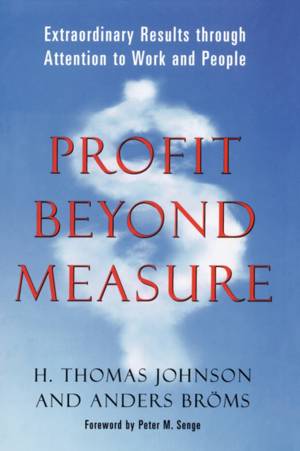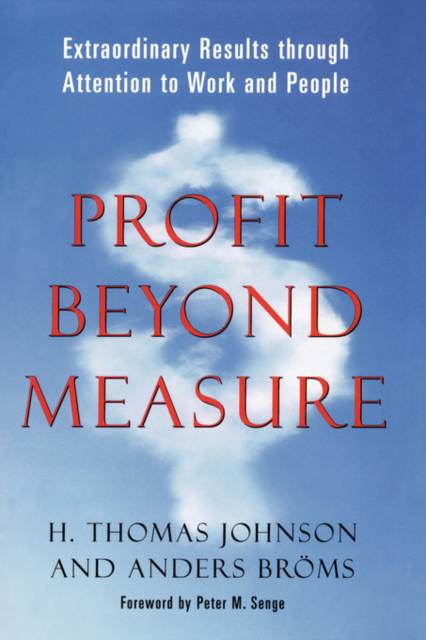
- Retrait gratuit dans votre magasin Club
- 7.000.000 titres dans notre catalogue
- Payer en toute sécurité
- Toujours un magasin près de chez vous
- Retrait gratuit dans votre magasin Club
- 7.000.0000 titres dans notre catalogue
- Payer en toute sécurité
- Toujours un magasin près de chez vous
Profit Beyond Measure
Extraordinary Results Through Attention to Work and People
H Thomas Johnson
Livre broché | Anglais
28,45 €
+ 56 points
Description
Waste has plagued almost every industrial-age firm for the past century. In this powerfully argued alternative to conventional cost management thinking, experts H. Thomas Johnson and Anders Bröms assert that any company can avoid the waste that is generated through excessive operating costs in the short run and excessive losses from market instability in the long run. To gain more secure levels of profitability, management must simply change how it thinks about work and how it organizes work.
Profit Beyond Measure details how two extremely profitable manufacturers, Toyota and the Swedish truck maker Scania, have rejected the traditional mechanistic mindset of managing by results that generates waste. Johnson and Bröms explain how Toyota and Scania achieve their legendary cost advantage through a revolutionary concept they call managing by means (MBM). Instead of being driven to meet preconceived accounting targets, the production systems of Toyota and Scania are governed by the three precepts that guide all living systems: self-organization, interdependence, and diversity.
Amid a wealth of new insights into Toyota's vaunted system, Johnson and Bröms introduce the tools of MBM to show how design, production, and profitability analysis are done to customer order. They demonstrate that by following the principles that emulate life systems, even a lean and profitable company can organize work to greatly lessen its long-term earnings instability and sharply reduce its short-run operating costs.
Scania has achieved sixty-five years of financial stability and longevity in the face of fierce competition. Toyota has amassed a market value since 1988 that has rivaled -- or sometimes surpassed -- the American "Big Three" automakers combined. The principles that Johnson and Bröms set forth in Profit Beyond Measure can guarantee the same richer, longer life to any company that applies them.
Profit Beyond Measure details how two extremely profitable manufacturers, Toyota and the Swedish truck maker Scania, have rejected the traditional mechanistic mindset of managing by results that generates waste. Johnson and Bröms explain how Toyota and Scania achieve their legendary cost advantage through a revolutionary concept they call managing by means (MBM). Instead of being driven to meet preconceived accounting targets, the production systems of Toyota and Scania are governed by the three precepts that guide all living systems: self-organization, interdependence, and diversity.
Amid a wealth of new insights into Toyota's vaunted system, Johnson and Bröms introduce the tools of MBM to show how design, production, and profitability analysis are done to customer order. They demonstrate that by following the principles that emulate life systems, even a lean and profitable company can organize work to greatly lessen its long-term earnings instability and sharply reduce its short-run operating costs.
Scania has achieved sixty-five years of financial stability and longevity in the face of fierce competition. Toyota has amassed a market value since 1988 that has rivaled -- or sometimes surpassed -- the American "Big Three" automakers combined. The principles that Johnson and Bröms set forth in Profit Beyond Measure can guarantee the same richer, longer life to any company that applies them.
Spécifications
Parties prenantes
- Auteur(s) :
- Editeur:
Contenu
- Nombre de pages :
- 280
- Langue:
- Anglais
Caractéristiques
- EAN:
- 9781439124628
- Date de parution :
- 01-08-08
- Format:
- Livre broché
- Format numérique:
- Trade paperback (VS)
- Dimensions :
- 156 mm x 230 mm
- Poids :
- 439 g

Les avis
Nous publions uniquement les avis qui respectent les conditions requises. Consultez nos conditions pour les avis.






